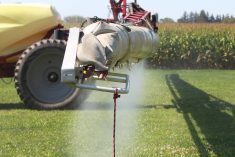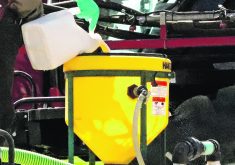A member of a scientific panel that reviewed a potential link between glyphosate and cancer says it doesn’t matter who pays for scientific research.
David Garabrant, a University of Michigan epidemiologist, said “industry funded” science versus “publicly funded” receives too much attention. Instead, the public should evaluate the merits of the science.
“We should focus on the quality of the analysis and the quality of the comments, not the affiliation of the author.”
Garabrant’s connection to corporate agriculture is under the microscope because he participated in an industry funded panel looking at the safety of glyphosate, the active ingredient in Roundup and the most popular herbicide in the world.
Read Also

Farming Smarter receives financial boost from Alberta government for potato research
Farming Smarter near Lethbridge got a boost to its research equipment, thanks to the Alberta government’s increase in funding for research associations.
On Dec. 7, the panel members, 15 toxicologists and epidemiologists from Canada, the United States, Europe and elsewhere, presented their findings at a risk assessment conference in Virginia. You can find the list of those panel members here.
Related story: Scientists find no evidence glyphosate causes cancer
After reviewing the relevant papers, they decided there’s no evidence that glyphosate causes cancer.
“None of the results from a very large database, using different methodologies, provides evidence of, or a potential mechanism for, human carcinogenesis,” they said in the paper’s abstract.
The panel’s conclusion contradicts a World Health Organization report from earlier this year.
In March, the International Agency for Research on Cancer (IARC), a different group of global experts, reviewed scientific studies on glyphosate and determined the herbicide likely causes cancer in humans.
The IARC glyphosate classification of “probably carcinogenic to humans” provoked angry responses from Monsanto, which makes Roundup, and many people in the agriculture industry.
“We don’t know how IARC could reach a conclusion that is such a dramatic departure from … regulatory agencies around the globe,” said Philip Miller, vice-president of global regulatory affairs at Monsanto.
“We have issued an urgent request for appropriate personnel of the WHO to sit down with the global glyphosate taskforces and other regulatory agencies to account for the scientific studies used in their analysis and, equally as important, to account for those scientific studies that were disregarded.”
Monsanto challenged the IARC classification, hiring Intertek Scientific & Regulatory Consultancy to study the matter. Intertek assembled a panel this summer to review the IARC findings.
The panel members, including University of Guelph toxicologist Keith Solomon, said IARC relied too heavily on questionable studies.
“IARC’s equivalent working groups’ reviews suffered from significant weaknesses such as selectivity in the choice of data reviewed, failure to use all relevant biologic information … and failure to use weight-of-evidence (WOE) evaluations.”
Garabrant was part of a panel sub-group that evaluated studies on glyphosate exposure, non-Hodgkin’s lymphoma and multiple myeloma.
He said the Intertek panel and IARC reviewed similar scientific papers, but the Intertek experts gave less weight to studies where subjects are interviewed following a cancer diagnosis.
“The concern, always present in a case control study, is whether you can re-construct that past information accurately,” Garabrant said.
“People with cancer wonder why they got it…. What did I eat… what chemicals were I exposed to? There’s always concern… about reporting bias.”
Garabrant and the Intertek panel relied on a 2005 paper by Anneclaire De Roos of the University of Washington. De Roos studied more than 50,000 pesticide applicators in Iowa and North Carolina who documented their exposure to glyphosate prior to any sort of diagnosis.
De Roos concluded that glyphosate exposure was not associated with an incidence of cancer.
“We felt that study was far more reliable than the other studies,” Garabrant said. “We think the limitations of the other studies made them not good indicators of … the relative risk.
The panel findings will likely be controversial because of the affiliation with Monsanto.
Garabrant said argument and discussion is standard fare in his profession.
“We’re supposed to critique each other’s work…. An active and heated discourse, that’s part of science.”
Summary of Intertek panel findings:
• Glyphosate doesn’t cause cancer in lab rats.
• Glyphosate is not genotoxic, meaning it doesn’t cause cellular damage or mutations.
• Credible, high quality epidemiological studies do not show a link between glyphosate exposure and cancer.
Contact robert.arnason@producer.com


















